#characters from the world of shannara
Explore tagged Tumblr posts
Text
The thing that I always found abominably fascinating and insanely mind-blowing with the Earthsea series is that it breaks all the worn-out, over-used, “seen everywhere” cliches of fantasy people complain about today and try to avoid.
Tired of your typical Europe-setting? Here is a world of islands influenced by a lot of various non-European civilizations!
Tired of having a white-predominant cast? Here is a series where people of color are the dominant ethnicities and the white are the minority and bizarre barbarian foreigners from far away!
Tired of having the heroes go on grand and perilous monster-slaying quest to fight some dark overlord or fetch a magical item? Here are books where the villains are elusive, abstract and philosophical threats, where the quests to defeat them are very down-to-earth, solitary and rely more on self-search and the understanding of human nature rather than great exploits.
Tired of seeing the same old-worn out fantasy races tropes? None of this here!
This book series was created with the intention of subverting, avoiding or breaking the new tropes and stereotypes that were rising up with the success of Tolkien’s work. It was made to be different and ground-breaking and stereotype-crushing, and it worked extremely well, becoming a classic of fantasy literature and influencing the genre massively... And yet, people only rediscover it today, and know about it today somehow. (Well a “large” today including the dozen of last years of so).
This series is the perfect example of the “new” fantasy that rises up in the modern era, as an attempt to “break off” from the “traditional” or “cliche” fantasy... And the first book has been sitting there since the END OF THE 60s!!!
There are more examples I could point out of books that present to us a completely out-there, trope reinventing, stereotype breaking form of fantasy - and that yet have been there since the 70s or the 80s, or even before! As I went back in time to see several of the “classics” of fantasy literature, I came to understand something - a lot of the “cliches” and “stereotypes” and “over-used tropes” of fantasy people complain about today were not at all dominant for a very long time. If you believe the words of many people out there, you imagine fantasy never had black characters or queer characters or non-European settings or non-Tolkienesque plotlines until the 2010s or something... Which is not true. Fantasy was such a varied, bizarre, diverse genre in its literary form all throughout the 20th century, and many “old” works of the first generations of the post-Tolkien fantasy are basically what people want to see today as “pattern-breaking and fresh new fantasy”.
The Tolkienesque-fantasy and all of its cliches and stereotypes were not so much dominant as just present in a handful of massively popular and widespread works - the case of the Shannara series can be pointed out, as its first book was PRAISED at the time for being able to recreate a Tolkien story in the 70s, and it was because it was mostly a copy of the Lord of the Rings that it got so popular (and why it is not well-liked today). And then the 80s rolled and early D&D reignited the flame of the Tolkien-inspired fantasy. By the 90s, it seemed Tolkien had been used and over-used to death, and people didn’t trust it all anymore... Which is why David Eddings’ Belgariad series was created. Its key point was to take back all the elements of the traditional epic fantasy story, but reassemble them, freshen them up, twist them slightly, all of that to re-create a by-the-book BUT fresh, new and interesting series. It was an attempt at prooving that, with innovation and some twists and modernization, the Tolkienesque fantasy would not die - and it worked massively well. And then in the 2000s, the Lord of the Rings movie sealed the deal.
All these works make it look like fantasy had always been copying or taking inspiration from Tolkien. But it is false. It is true that most of the classics are tied to Tolkien, but not always in imitation or re-creation - in the case of “Earthsea”, there was a willing attempt at getting away and inverting the Tolkienesque fantasy to create a fantasy that went the very opposite direction. Same thing with the Elric Saga, also designed to be the reverse or opposite of The Lord of the Rings, and which in turn became the classic of another new genre of fantasy: dark fantasy. And Conan in all that? People forget that the Conan the Barbarian series were just as influential for fantasy works as Tolkien’s Lord of the Rings was. The Elric Saga, again, was created to completely reverse and avoid the Conan-like fantasy. A similar thing was done with Leiber for his “Fafhrd and the Gray Mouser” series, which was designed to break away from the Conan “heroic fantasy” style and reinvent the genre in a new direction.
There are so many “old” and “classic” works of literary fantasy that actually do not feel like a “classic” at all because they have all the vibes, elements and expectations one has from a non-classic, non-traditional fantasy... BUT THEY ARE THE FOUNDATIONS, they are the basis and classics and inspirations of fantasy. And it all shows this huge gap between what people think fantasy is, and what fantasy really was - it is a fascinating case study of how one specific trend somehow got over the entire genre. Imagine a world where people think Gothic novels can only have a vampire or the ghost of a judge, and must be Bram Stokers-inspired, and that everybody points out they are tired to see Dracula-expies everywhere... Only to discover the stories of Edgar Allan Poe and be baffled by them and their “inventivity” and “breaking of patterns”. I’m sorry, that’s the fastest comparison I can make, but this feels just like that. There is this strangely specific idea of what fantasy is today forged on a few items... I think, beyond the massive success of Tolkien and imitators, D&D probably is also to “blame” for how people see fantasy today.
But even then, D&D took inspiration from so many non-conventional works of fantasy... Yes many became “classics” now, though often ignored by the masses - The Elric Saga, and Fafhrd and the Gray Mouser were big influences. But take the Jack Vance series “The Dying Earth”, another big inspiration on early D&D. Take that. This series is from the 50s - FROM THE 50S - and yet it is a unique genre of sci-fi fantasy that I haven’t seen much being done around, and it creates such a weird, whimsical, bizarre, surrealistic fantasy world, it feels completely unique. And again, it is a classic of the 50s and 60s.
I don’t really know where I try to go with this but the important thing is: when someone wants to read “non-traditional” or “non-Tolkienesque” fantasy, or “non-stereotyped” fantasy, it is possible, instead of searching for every new author nowadays (not a bad thing to do that though), it is possible to just go back in time, look back at the books of the 70s, 60s and 50s, and find there a novelty, a freshness and an inventivity that is lacking in a mass production of modern day fantasy. And that such a thing is possible is truly crazy for me. I don’t know if such a thing happened with other literary genres, but it is insane that sometimes in fantasy, to see “new” things you just have to look back into the past.
#fantasy#fantasy literature#tolkien#tolkienesque literature#earthsea#ursula le guin#the dying earth#the elric saga#i don't know if I should tag them all#this is really just a random shot here#fantasy stereotypes#fantasy cliches#fantasy tropes
237 notes
·
View notes
Text
It's been a while since I last posted my drawings. The reason was a big project that I can finally show now. The idea started with the desire to illustrate a meeting of my OC - Lucan with the wonderful Aria - the OC of an even more wonderful @ariawins.
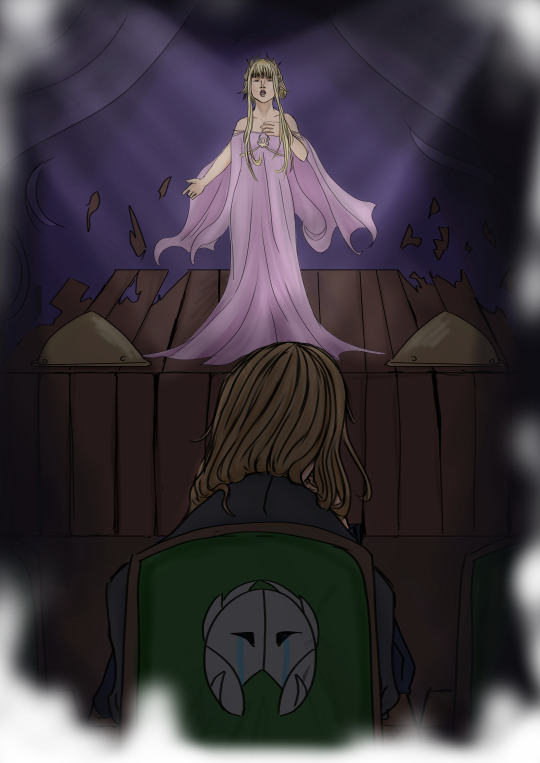
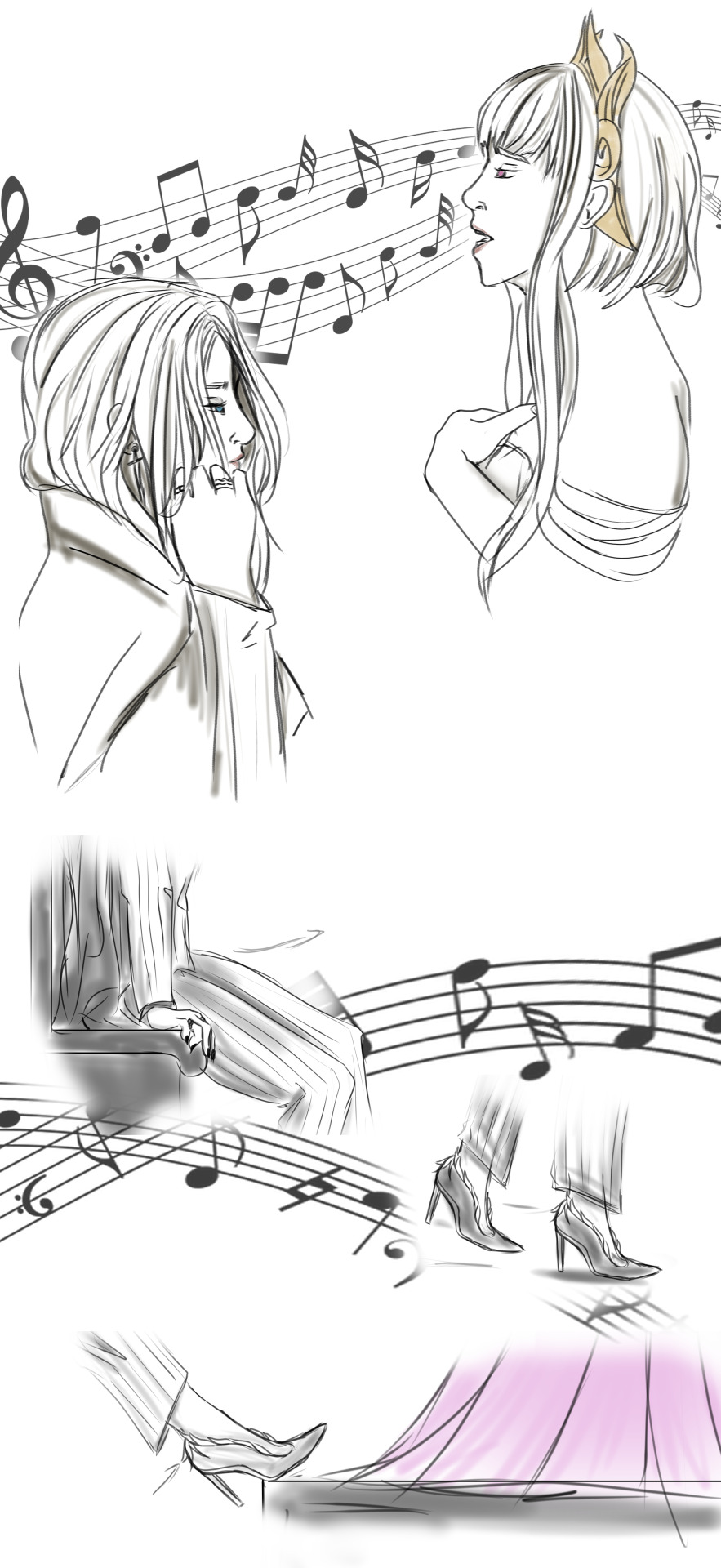
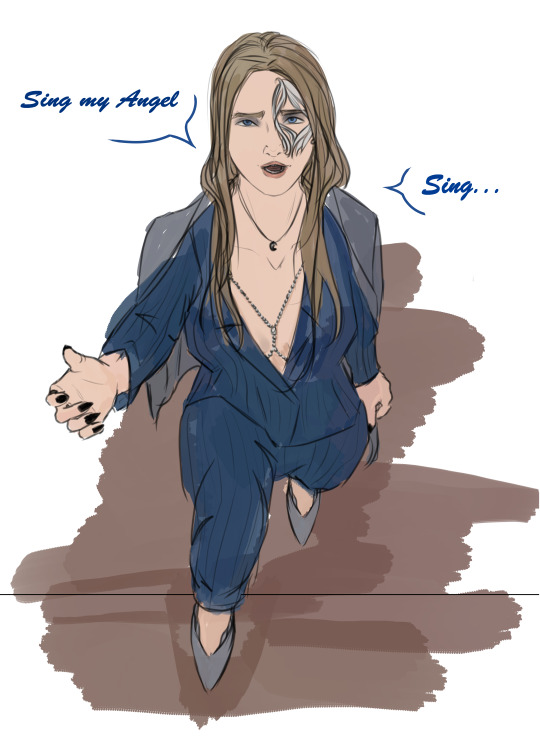
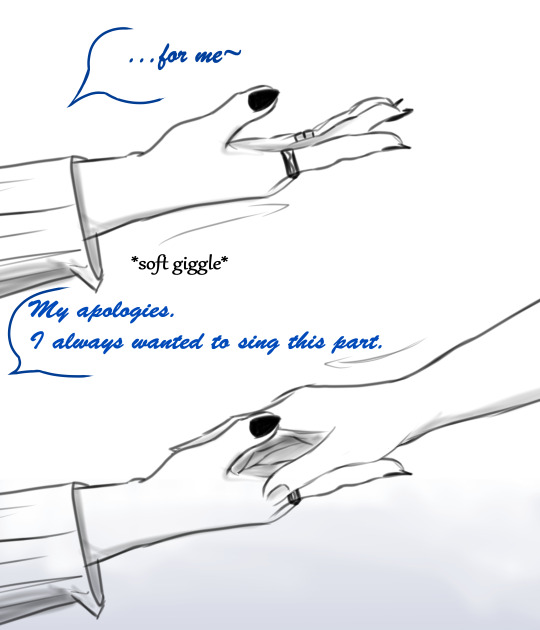
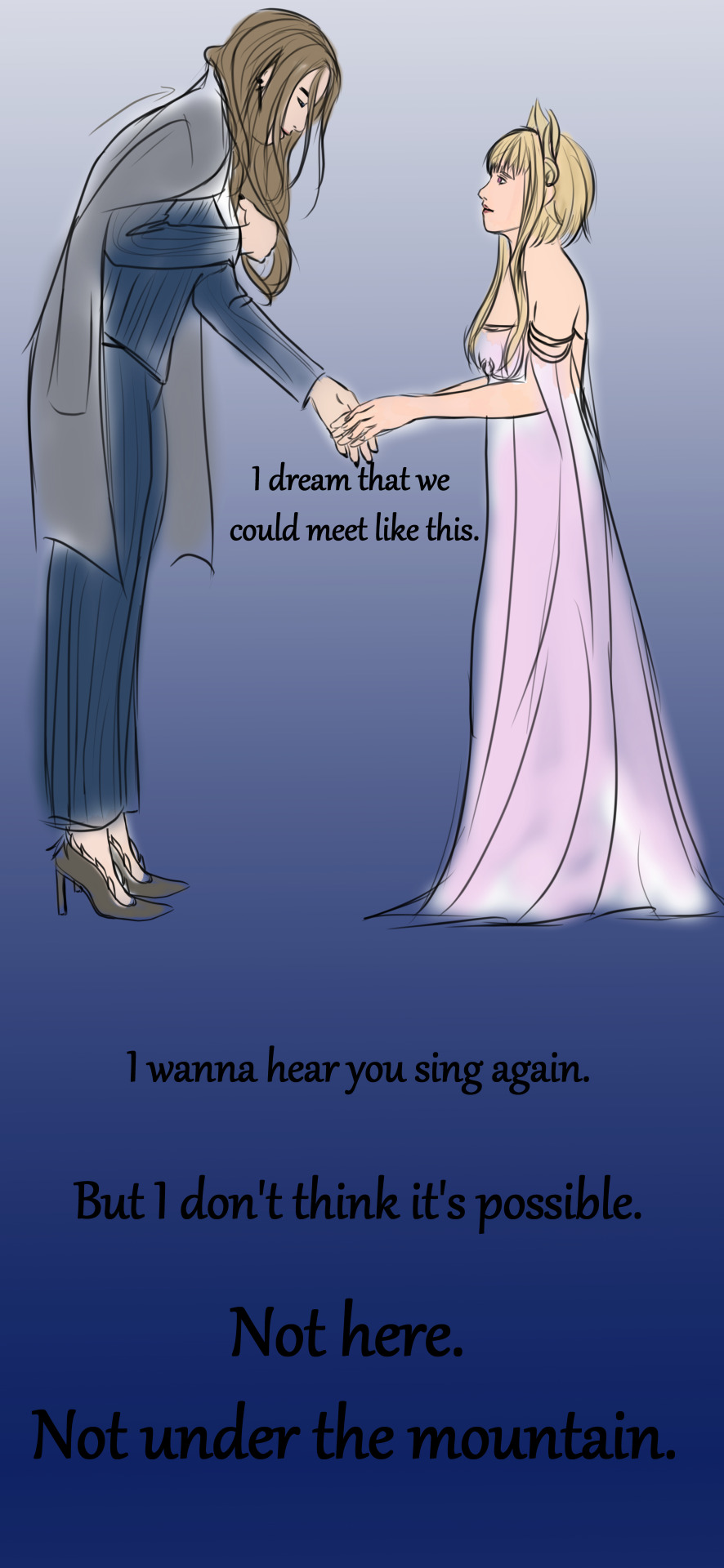
Later the idea evolved into something even bigger. Inspired by characters created by some of the fans of the game Obscura, I created a few alternate endings to the above comic. I wanted them to be a part of it.
The first one is just one of the Obscura characters - Keir (my favorite among the game characters) and my OC simply interacting with each other in their daily routine.
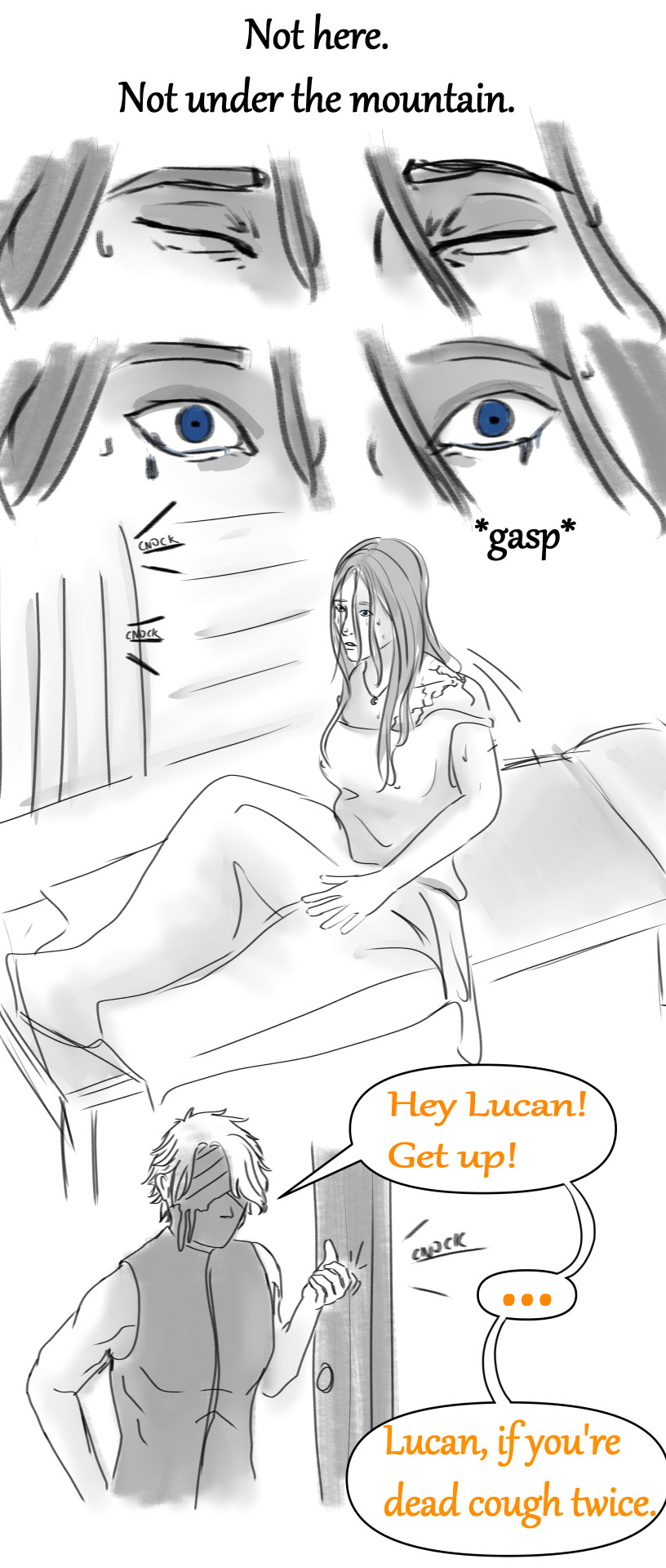
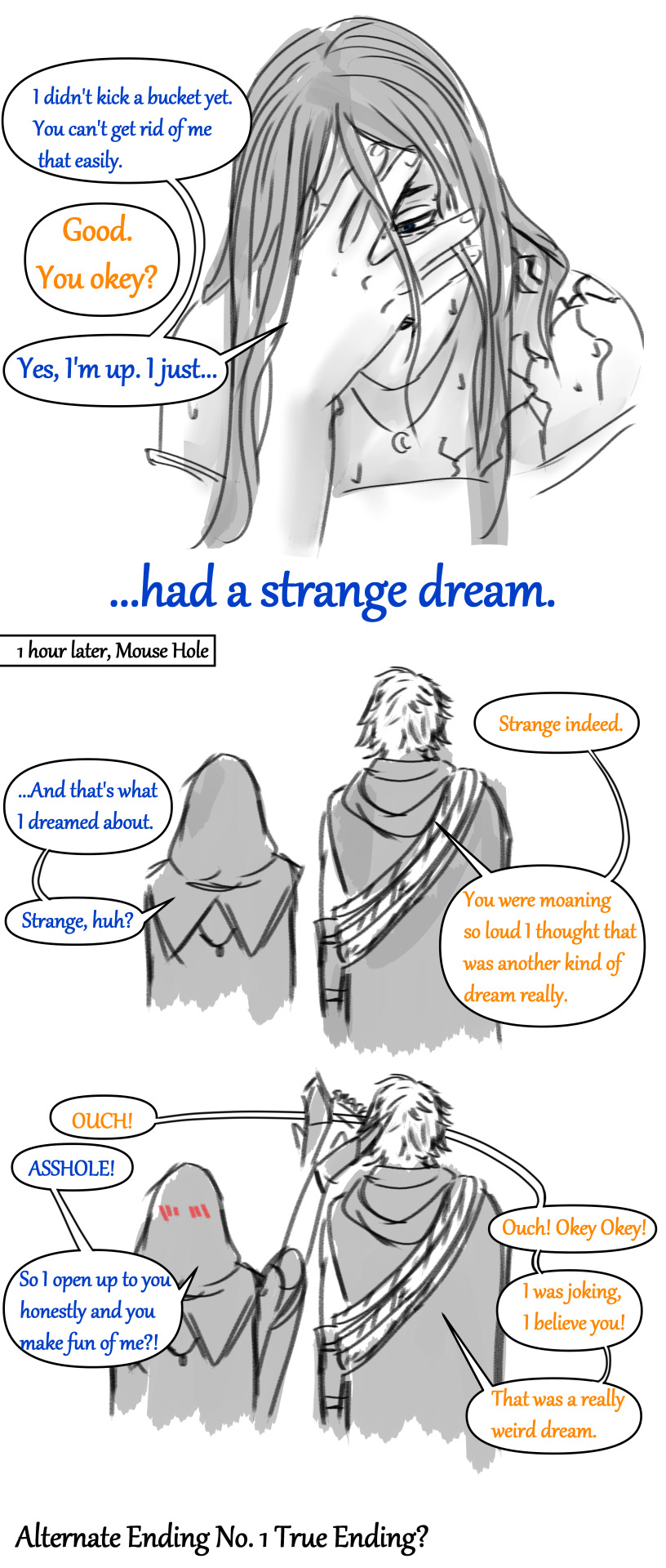
The second ending is a different story. Modern AU, a bit more positive, with the participation of wonderful characters from wonderful people and artists:
dab Aria / Happy the singer and her beautiful wife Scarlett - @ariawins
Solo goth mama/ a wonderful piano player, the queen of the Gothic style - @millethe
Wonderfull Ira, the best twin I could find in this world/ Naira - @Shannara / @shannaranirina
Chaotic tired Lucan in @rottenraccoons non-existent (yet) merch - @lazloemporium
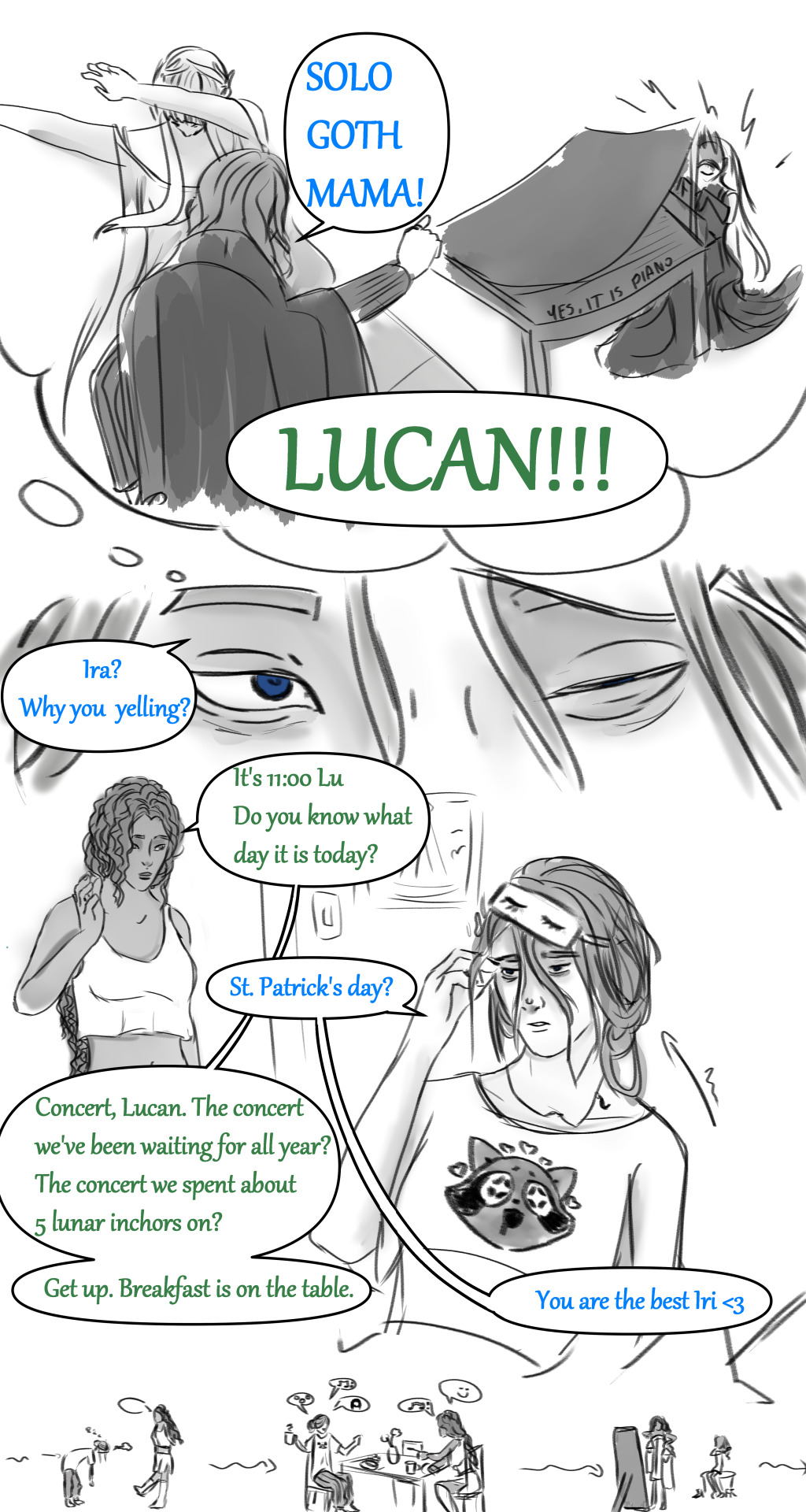
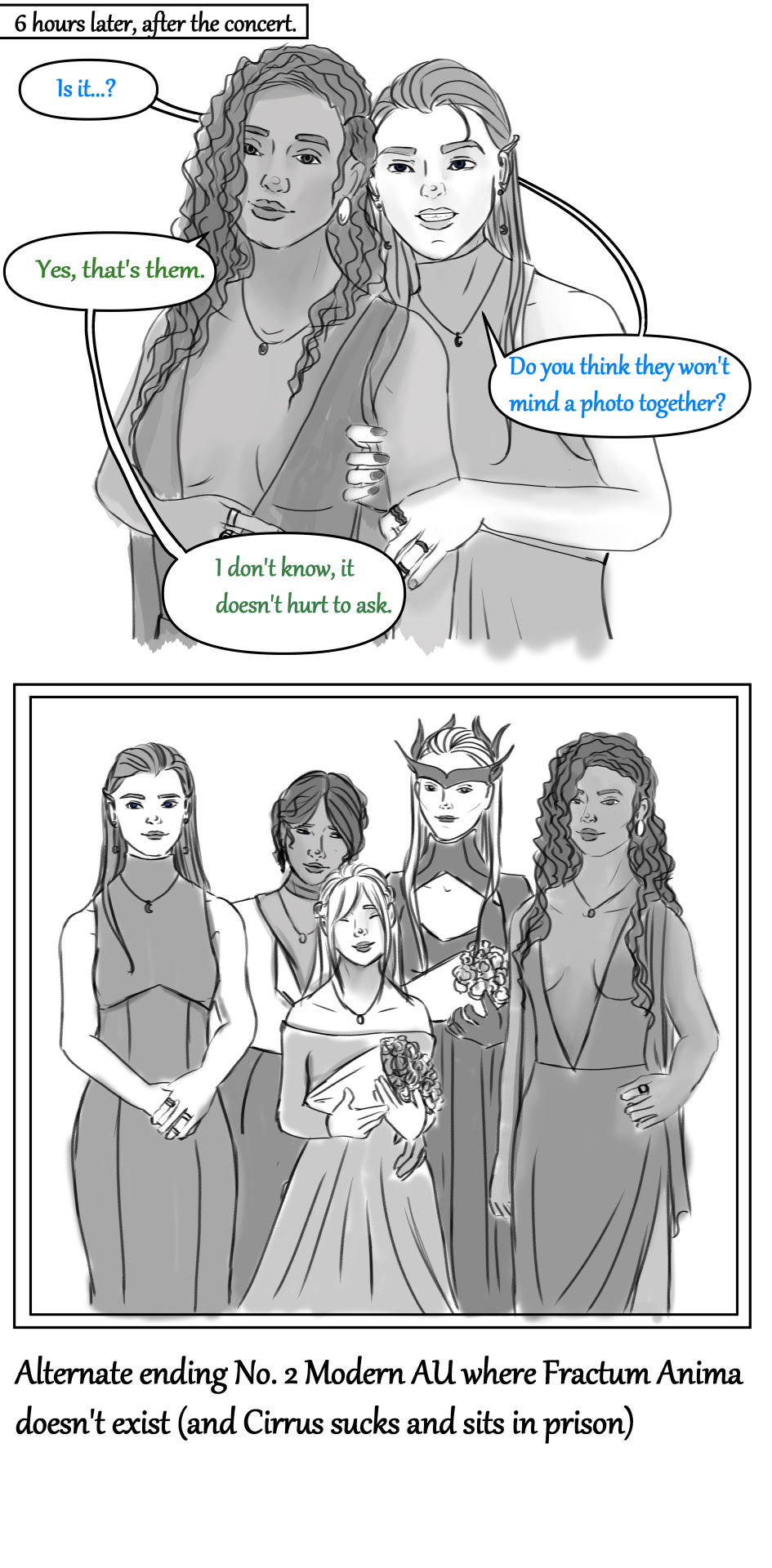
And the last of them, a masterpiece, drama and action combined in a few panels with great characters:
Still chaotic tired Lucan - @lazloemporium
Wonderfull Keir, considered in the community as husband material, character of Obscura game (still my favorite)
Cirrus/ Evil priest - also character of Obscura game, hate him ( but I love how well written a character he is)
Aria in her casual clothes and mask which everybody loves - @ariawins
The knight in shining armor who stole my heart Celeste whom I had the pleasure of drawing(and will definitely draw more than once) - @kimikoarts
Once again wonderfull Naira - @Shannara / @shannaranirina
As deadly as she is beautiful Void - @aieevee16
Last but not least mysterious Garnet - @lyra3884
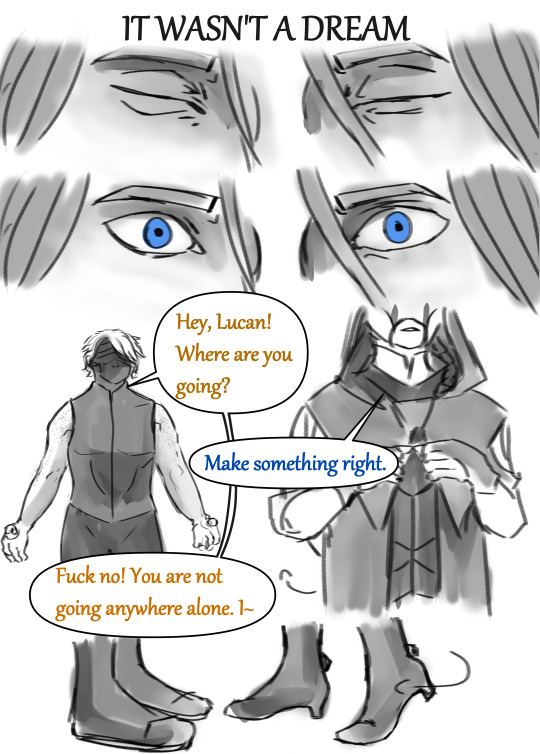
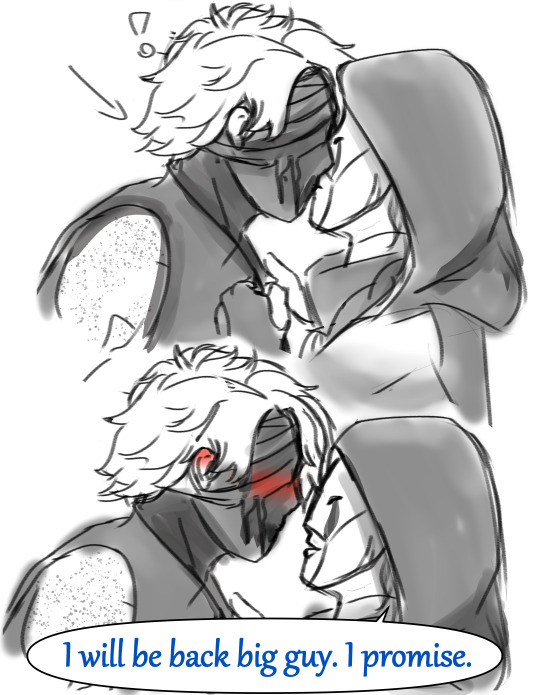
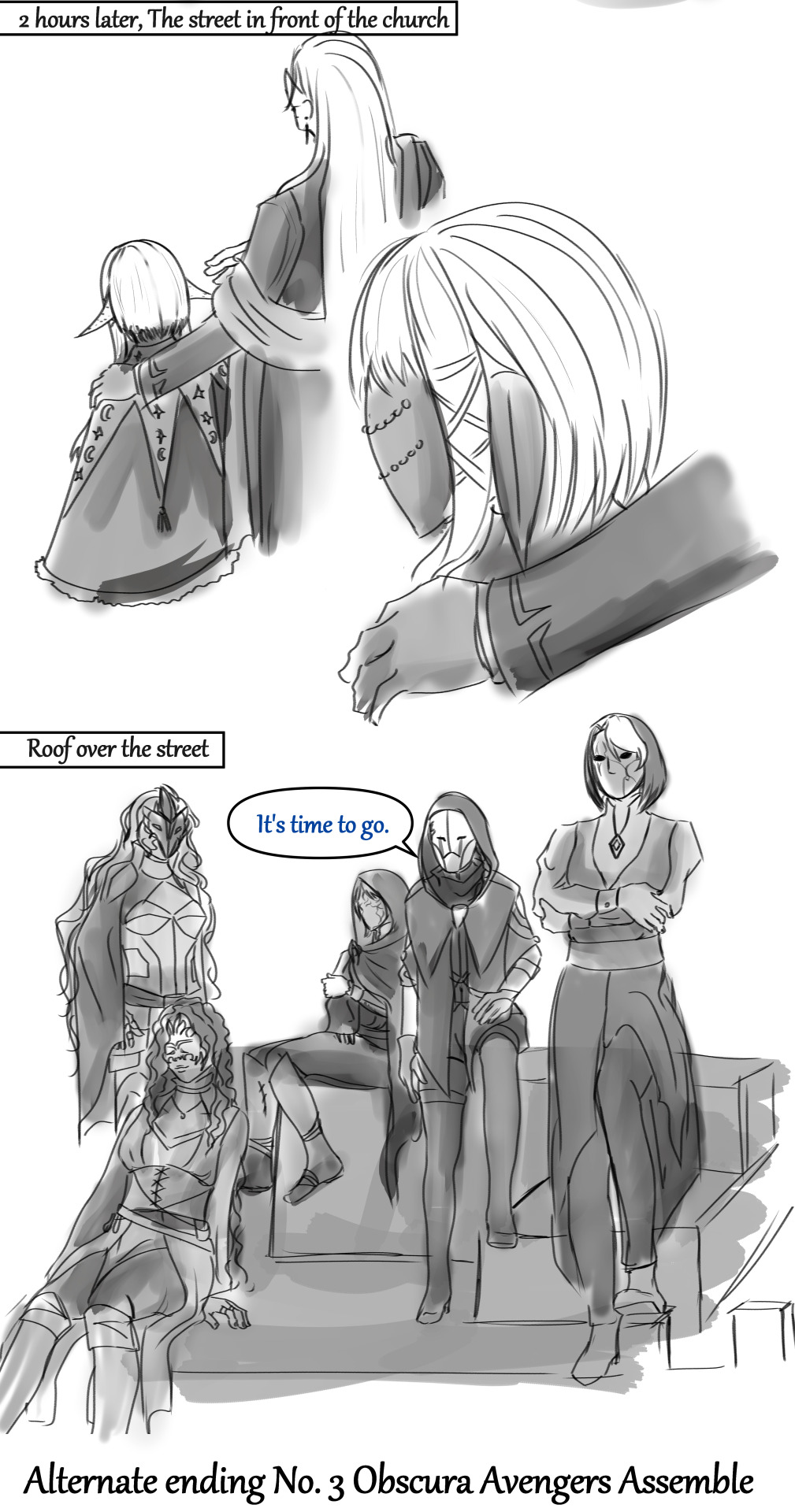
Despite the amount of time spent on drawing, I'm happy and proud to have drawn it. I had a lot of fun doing it and the great community around the game gave me a lot of support and inspiration.
#obscura vn#oc#keir#keir obscura#oc art#fanart#cirrus obscura#ariawins#aieevee16#kimikoarts#millethe#webcomic#alternate universe#alternative ending#Keir the husband material
12 notes
·
View notes
Text
Tag game: 10 characters from 10 fandoms
I was tagged by @hogans-heroes and my old laptop is working for 5 minutes on it's last legs so let's do this before it craps out again! God I gotta go way back in the earlier fandom days for some of these, I haven't been in a fandom since I was a teenager until MotA & Dune
1. Gale "Buck" Cleven (Masters of the Air) I would put Bucky as well but I can only choose one *cries* and I feel a complete kinship with this character and his mannerisms/traumas/personality etc.

2. Paul Atreides (Dune/Dune Part Two) look, I know he's an anti-hero and drank the worm juice so he turned into a crazy dictator but mans went through a lot and became a bad-ass doing it

3. Kiba (Wolf's Rain) do NOT get me started unless you want me a blubbering mess for a week straight

4. Ryuk (Death Note)

5. Stiles Stilinski (Teen Wolf) YES I was a Teen Wolf girlie.. sue me

6. Klaus Mikaelson (The Vampire Diaries/The Originals)

7. Arthur Pendragon (Merlin) still LOVE this character but can't help but get a visceral reaction when I look at him now because he looks like my ex. Actor has the same fucking first name too. Go figure. Sorry, boo (Arthur)!

8. Wil Ohmsford (Shannara Chronicles) My obsession for Austin Butler I wholeheartedly blame for this one. He should be higher up on the list, but eh. Love him, he's an idiot tasked with saving the world. Dorky dumbass x 100 with the situational awareness of a 2 week old kitten.

9. Triss (The Witcher: Wild Hunt Game version)

10. Dean Winchester (Supernatural) Supernatural really dropped the ball in later seasons honestly, but I still love the earlier ones and the character. Him and Sam are just alternative universe versions of me and my best friend.

I'm gonna tag: @avonne-writes @onyxsboxes @antiquitea @trashbag-baby666 if you guys feel like it and anyone else who would like to!
12 notes
·
View notes
Text
Speaking of Otha and the Master... Fat sorcerers or wizards is actually something quite recurring in fantasy. There is a page on TV Tropes and Idioms called "Squishy Wizards" which highlights how wizards in fantasy typically do not have a fighting body - they are too old or too young, skinny or chubby. To have a muscular, fit, warrior-built wizard was seen for a time as a subversion of the traditional wizard (see for example The Kingkiller Chronicles, which was praised at the time for having a warrior-wizard as a protagonist).
While fat wizards do not typically lead the archetype, they're still recurring. In another 80s classics of fantasy, the Riftwar books by Raymond E. Feist (in France they're better known as the adventures of Pug the wizard), the protagonist is first tutored in magic by a Gandalf copy (elderly bearded wizard who likes to smoke a pipe), but with a few differences - he has a tiny pet dragon, he is a human court wizard instead of an otherwordly wanderer, and... he is noted to be a large and fat man with a round belly. Name's Kulgan by the way. Don't ask me more about him, because I couldn't even finish the first book of the series (while I don't mind some "cliche fantasy", there's some stereotypical fantasy that just doesn't work with me, and the Riftwar books do not click for now. Maybe if someone encourages me to read them or has positive things to say about them... But for now, nah).
A different fantasy series, but one I quite enjoyed and fully read (unlike the Riftwar one) is the 70s classic "The Fionavar Tapestry", which is basically "What if Lord of the Rings crossed over with Narnia, and was even more epic and even more mythological as we sprinkle in Cybele, and Irish mythology, and Arthuriana, and other stuff?". You have book series that pastiche and imitate in obvious ways Lord of the Rings (Shannara). You have book serie that take back, reinvent, subvert Lord of the Rings (Belgariad). And you have the Fionavar tapestry, which was actually written by one of the men who worked on compiling and studying Tolkien's works and notes to re-create things like the Silmarillion and other books, and thus literaly pays homage and soars from the world created by Tolkien to do its own thing (though if you do not enjoy hyper-intellectual, hyper-poetic, hyper-mythical fantasy this series is not for you). There's three wizards in this series. One is you Saruman ; another is your Gandalf (but with the bonus point that he is in a gay relationship with a dwarf king) ; and the third, more unique to the series, is described a curvy, bellied fat man. And when we finally get a bit of background info on him (in the third book of the trilogy) we learn that he was always the weakest of the three wizards, and mostly was into the wizard business to enjoy the comfortable life, high position and material pleasures it brought with it - hence why he is quite a fat man today. In the third book he even complains at one point that due to being involved in war activty he has lost a lot of weight, only for other characters to mention he is still quite plump and far from thin.
Technically, when it comes to the "fat wizard" archetype we can go back to the first of the Earthsea books, "A Wizard of Earthsea", with the character of Vetch. Fellow student at the wizard-school with the protagonist, later becoming his own local sorcerer in his village, and described as a stout, large boy than man with a healthy appetite and a love for food... Fan-art today does regularly depict him as a big beautiful man he is strongly implied to be - though he might fall rather into the "large sidekick/fat bestfriend/chubby companion" archetype that I evoked in an earlier post. [Note: if you ever want to check out Earthsea, don't hesitate, because not only is it one of the foundations of the genre, which influenced all the later classics, but it was also one of the early attempts at doing a non-cliche fantasy - first exploration of a wizard school in fiction, first time having a wizard as a main protagonist in a fantasy story, with an archipelago setting specifically designed to not feel European in the slightest, AND with a non-white cast! You couldn't guess it due to all the illustrations and adaptations white-washing the hell out of the books, but Earthsea was all about black-skinned and copper-skinned and distinctively non-white people, and Ursula Le Guin was always very sad and mad each time the cover-artist or movie-makers made all of her cast whiter than bread dough. There's white people in Earthsea indeed, but they are the barbarian foreign minority serving evil gods, which was quite a perspective switch for a 60s fantasy series]
More generally, the "fat wizard" idea is often used to subvert or counter the "Gandalf archetype". One of the most famous examples is the wizard Bayaz, from Abercrombie's "The First Law" trilogy. Not to be confused with "The Wizard's First Law" by Terry Goodkind, a "regular" fantasy book that opened a quite... unfamous fantasy series, but which deserves a mention because it reuses and mixes the "fat counterpart/fat is evil" fantasy elements, by having the brother of the main protagonist (Michael Cypher) being described as "smaller, heavier and softer" than his brother, and ultimately falling for the lies and tricks of the main villain leading him to oppose his brother... But back to Abercrombie's The First Law, the entire point of this trilogy is to take back the archetypal epic fantasy story, but present it in a dark, cynical, morbid light. Bayaz is here the subversion and caricature of the typical "wizard mentor", Gandalf-type - he is the main wizard of the story, the patron of the protagonists, the one who leads them in their quest... But he is also a deceiving brute, a power-hungry war-mongerer, and a shady, amoral and selfish man. And this subversion of his Gandalf type is marked in his appearance, as he is described as a butcher-like man, large and thick, built with a mix of muscle and fat (and people who compare the statues once sculpted for him to his current state do point out how since his glory days he grew a gut).
And of course, no need to tell you that the "fat wizard" archetype blooms in works where the fatness of sorcerers and magic-users is systematized - ranging from Robin Hobb's The Soldier Son, to Terry Pratchett's Discworld, two universes where being fat is basically a pre-requisite to be a wizard...
5 notes
·
View notes
Text
types in tension: kit tanthalos as royal and skeptic
a lot of people have pointed out how archetypal and dnd-esque the characters from willow feel - and I agree! they're absolutely tropey and built to serve very clear, specific functions within the ensemble. willow is the wizard and the mentor. elora is the sorcerer and the chosen one. boorman is the rogue/barbarian and the sixth ranger.
but I want to talk about my favorite example of this: kit. kit has her own clear place in the ensemble - but the archetypes she's made up of are ones usually in tension. this gives her a fascinating kind of depth and motivation - and is, perhaps, reflective of similar tensions in the rest of the characters. let's discuss.
kit as the royal
kit is introduced in contrast to jade, her humble, dutiful, long-suffering knight. this highlights all of kit's opposite qualities: her relative arrogance, rebelliousness, and desire for adventure over duty. when she conflicts with her mother and makes a scene at the party, we understand that she's feeling constrained by the arranged marriage and dreading a future stifled political life like her mother's. but the narrative also makes it clear that this is a selfish thing to do; kit clearly hurts jade, graydon, and airk, who haven't done anything wrong.
so kit is set up as a rebellious/spoiled royal: she chafes against her responsibilities and her sheltered life, not knowing the full extent of her privilege. she wants to go into the outside world but underestimates how dangerous it is. her arc should be about getting thrust into those dangers and balancing her headstrong, cocky independence with a dose of humility. she should come back stronger, but with more respect for duty and the difficulty of leadership.
basically, kit should be kind of like merida. which makes a lot of sense, given the very merida-like speech kit gives during the party.
but then airk gets kidnapped, and kit is thrust into the outside world, taking her place in an ensemble of other characters. and something interesting happens: kit becomes a skeptic.
kit as the skeptic
to balance the group, they were always going to need a skeptic - someone more invested than boorman (the apathetic) but not falling over themselves to save the world like willow (the mentor and true believer in elora danan, at least as a concept). with jade sworn to the queen’s (and thus elora’s) service and graydon falling in love, they needed someone who could/would consistently challenge elora; who could suggest practical courses of action against high fantasy wish-wash; and whose narrative arc toward belief would be, essentially, the show's ideological argument for hope and idealism.
so it's kit. kit wants to keep them on track. she doubts magic and the idealistic plans the others have for elora. not only is she aware of the practical concerns of the quest, she's often the one reminding the others of that. while it may be out of jealousy, the kinds of questions she asks - “is this really working?”, "how long until elora can do magic?" - are things that the party has to consider just...logically. will it significantly slow their travel if willow has to teach elora for an extended period of time? will they need more rations? when will elora be able to contribute to potential combat?
skeptics on magic shows like this often get a bad rep (except when they get a very good rep because they're hot and sad), because we know the show's overarching philosophy is one of belief. there's a combination of out-of-universe impatience, waiting for the skeptic's narrative arc to catch up, and in-universe - well, arcing, where the the events of the story prove the skeptic wrong and the other characters (the believers) right.
here's the thing, though: skeptics have usually come by their cynical realism after a hard, unfair life. they've seen some shit. they've got a tragic backstory. they’re your han solo from star wars, eretria from the shannara chronicles, cara mason from legend of the seeker. we understand their abrasiveness and accept their position as a legitimate argument because it's born from experience - experience that the idealistic heroes don't have yet.
so here's an interesting tension: how is kit both royal and skeptic?
because the arc of a rebellious/spoiled royal hinges on the fact that they don’t have experience. they don’t know how tough the real world is, and they haven’t thought through the practical considerations. and where the royal is the one who needs to be taught these things, the skeptic is usually the one teaching.
I suspect this is the crux of some people’s annoyance with kit - she’s taking the place of the skeptic in the party, rough-edged but logical, but her introduction indicates she doesn’t have enough experience for that. so instead of going, “you know, even if that wasn’t the nicest way to put it, that’s a good point. in-universe, it doesn’t seem like elora is going to learn magic very fast, and that might be a legitimate liability to the party,” the response is, “what do you know? you grew up a spoiled brat!”
why is this happening?
before I discuss the implications of kit’s character as both royal and skeptic, I want to take a moment to talk about why it’s happening. I think there’s lots of factors - well-written characters often involve things in tension, and there’s a whole layer of kit trying to imitate the seasoned warrior type of her father - but I think there's one main reason: elora must displace kit as the royal in the ensemble.
elora isn’t spoiled, of course. but she starts out pretty naive and chases after airk without practical consideration to her actual abilities or (later) her duties as the chosen one. she is the one that everyone has sworn to protect and save, sometimes from problems of her own making. elora must learn to lead, master her powers, and make hard decisions in a messy world.
the switch is clear even in the very first interaction kit has with elora. when kit asks if dove has any battle experience and dove snidely reverses the question, it’s establishing kit as the more practical, skeptical, and indeed, experienced, voice. kit has, actually, had more real-world battle experience than dove.
so while we were initially introduced to kit as the hero and royal, in the party, elora is the hero and royal, with kit falling to the lancer and the skeptic. this neatly dovetails into kit’s feelings of abandonment and jealousy over everyone choosing elora. even the framework of the story, the meta functions of the characters, have placed elora over kit.
the implications
so why am I even talking about this? why does it matter? after all, despite her function in the party, large parts of kit’s arc follow the rebellious/spoiled royal’ arc. kit is constantly getting knocked down a peg, losing what she thought was hers; this follows the general arc of spoiled royals losing everything and then rebuilding themselves as stronger, kinder people. but I do think the royal-skeptic tension adds another layer, and here are three thoughts as to why:
1) I said that viewers might feel that kit’s royal background makes her “unqualified” to be the skeptic; I also think this is an interesting lens to apply to the characters. graydon dismisses kit’s irritation with elora as “she’s just jealous.” jade and boorman say that kit could never do the dirty work of killing a corrupted graydon, with the implication being that kit can’t take the reality of it. are these lines just excuses for the writers to tell us with 100% certainty what kit’s motivations and limits are? maybe. but it’s more interesting to me if these characters are interpreting kit through their experiences of her - as a royal who graydon barely knows and who jade has spent years protecting - and missing some stuff.
2) it adds a cool dimension to kit and elora’s relationship. we’ve talked about the rebellious/spoiled royal’s arc as one of learning humility, and that’s one kit’s definitely going on. but at the same time, kit must complete a skeptic’s arc: learning to believe in magic and idealism, learning to believe in the chosen one/royal - which means the story is just as dependent on elora proving herself to kit as it is kit yielding to elora. a lot of kit’s other relationships center on kit humbling herself (kit has to apologize to jade and graydon, kit has to learn to respect willow). but kit and elora’s dynamic - and their whole arcs! - require both of them to make an equal effort.
3) the royal-skeptic tension just...adds all sorts of possible motivational layers to kit’s actions. there’s the jealousy underlying kit’s questions to elora, which we’ve talked about: it’s both a royal’s discomfort with losing privilege and a skeptic’s practical logic. but there’s also kit’s name-dropping; it seems like a classic royal move to get special treatment, but two of the three times she does it, she’s doing it for pretty practical reasons. she’s identifying who sent them to the nelwins - not trying to pull rank - and she’s proving to the bonereavers that she can get them money - a pragmatic offer to get the party out of trouble. how much of kit’s friction with willow is royal naïveté, ignoring the words of a more experienced mentor, and how much of it is an equal competing philosophy, a skeptic’s real-world practicality against an idealist’s grand plans? it’s both. kit is always both.
(note: I feel like this reads as favoring skeptics over royals, which is not the case; they’re value-neutral narratives. however, as this is, at least in part, my attempt to figure out why I've felt so bothered by people interpreting kit as simply a “spoiled princess,” some of that frustration may have leaked in. though I think even if kit had followed the royal arc to a T, with none of this archetypal tension, I still would have been frustrated by, like, misogyny and people not letting characters go on an arc. you can’t win, I suppose.)
103 notes
·
View notes
Text

While reading The Wishsong of Shannara, I couldn’t help but draw comparisons to The Lord of the Rings. While they aren’t the same story, the parallels are unmistakable—like two distant cousins, with one clearly outshining the other. Both stories share the hallmark elements of epic fantasy: a wise figure (in this case, the Druid) visiting to set a hero on a quest, a treacherous journey through dark and perilous lands, and a powerful, malevolent object that must be destroyed to rid the world of evil (in this case, a sentient book rather than a ring). Even the gathering of allies to support the hero on this journey echoes Tolkien’s famous Fellowship, though in The Wishsong of Shannara, the company splits into two groups, each with their own purpose. It’s the kind of structure that feels like a recipe for epic fantasy, where familiar ingredients are used to create a new but recognizable dish.
Yet, despite these clear similarities, Terry Brooks crafts a story that still stands on its own. The characters are well-developed, bringing depth and intrigue to the narrative. However, one thing that really took me out of the experience was the constant references to the previous books in the series. These reminders often felt clunky and forced, interrupting the flow of the story. It was as though the book itself was advertising, nudging readers to revisit the earlier installments or reminding them of events they should already know, even when it added little to the current narrative. This heavy-handed recap felt unnecessary and detracted from the immersion, almost like a commercial break in the middle of an otherwise engrossing story.
That being said, I did enjoy the book overall. The world-building and characters are strong enough to pull you in, and there’s something undeniably captivating about the quest and the challenges the characters face. But I made the mistake of reading this final installment first, and now that I’ve had the entire storyline more or less summarized for me in The Wishsong of Shannara, I feel less inclined to go back and read the previous two books. The constant references to past events left me feeling like I already know what happened, robbing me of the desire to experience those stories firsthand.
In the end, The Wishsong of Shannara is a solid entry in the epic fantasy genre. While it may not reach the towering heights of Tolkien, it certainly has its moments of magic and adventure. If only it trusted its readers a bit more to piece together the larger story without so many reminders, it might have left a deeper impact.
#the Wishsong of Shannara#the shannara chronicles#booklover#book review#booksbooksbooks#bookshelf#book recommendations#book reccs#book#bookish#bookworm#book quotes#books#booklr#books and reading#bookblr#book reading#book rambles
3 notes
·
View notes
Text
I had some time to kill at the library the other day and sat down for about 60 pages of The Shadow of What was Lost by James Islington. I've been eyeing it for a year or two because of its rad title and cover. I got about 30 pages in before I kinda looked up at the ceiling and went "Hmm. This is just Sword of Shannara again."
I think it's a lot better than that, but it feels structurally pretty similar. I think the thing that failed to hook me on it was the odd drop in stakes and scale between the prologue and the first chapter. Usually, with big fantasy stories that start in media res of some epic confrontation, you drop back down to the most normal shit in the world, but this book's first few chapters are so all over the place in terms of stakes that I couldn't even pin down what I should be worried about. After that, kicking off the adventure with a slightly worldly buddy and a fully ignorant protagonist was... well, I hate to act like unoriginality ruins a story, but the novelty and good execution that DO exist in the beginning only barely outweighed the derivativeness.
I think I dropped it off when the guys get kidnapped from the inn, and while that was really where I was hoping Islington would throw his big curveball, I had stuff to do and needed to leave the book. I might revisit it someday, but I'd be very curious to hear what fans of this series have to say about what makes it good. Execution of well-known tropes? Novel ideas? Compelling character arcs? I didn't sit with it long enough to see, but those all seemed possible.
4 notes
·
View notes
Text
Other Fantasy Subgenres:
Anthropomorphic Fantasy: anthropomorphism is the attribution of human characteristics, languages, behaviors, and motivations to an entity other than human. This something may be an inanimate object, natural phenomenon, or (and this is most often the case) animals.Watership Down
Arabian Fantasy: It is an old and traditional sub-genre that has seen a resurgence in the modern era. It is a sub-genre steeped in history and if not always mythic, then at least fable-like—which makes it an incredibly rich sub-genre. There are often stories within stories. Jinns, ghouls, sorcerers, real people and geography mixed with the legendary and fictional.Throne of the Crescent Moon
Bangsian Fantasy: Bangsian Fantasy is a sub-genre primarily concerned with the afterlife and specifically with the exploration of the afterlife. The sub-genre gets its name from author John Kendrick Bangs. Bangs wrote stories about the afterlife and the supernatural, but with a humorous style. Bangs is not the first writer, nor the last, who wrote stories like these, but his work gave the sub-genre shape. A common feature of Bangsian Fantasy is the inclusion of dead famous people and mythological characters. These stories tend (though not always) to have a genial tone. There are three main categories that Bangsian stories fall into: ghosts stuck in the living world, living people stuck in the world of the dead, and people who have died in a Heaven (or Hell). Heroes in Hell
Christian Fantasy: It is a sub-genre that utilizes and/or explores Christian ideas and themes. The religious elements can be deliberate and overt, but they can also be sub-textual and even allegorical.The Chronicles of Narnia
Celtic Fantasy: Celtic Fantasy encompasses all fantasy stories that drawn on Celtic legends and lore. The setting of most Celtic Fantasy is a medieval or ancient world. Some common elements: pagan religions, druids, matriarchal societies, romance, tragedy, strong ties to the natural world. Celtic Fantasy has a bit of a bad rap with strong literary and historic types because of its fictionalizing of real legends, cultures, societies, and peoples. Some even describe the sub-genre as escapist.The Little Country
Dragon Fantasy: 🐉Temeraire
Fantastique: Fantastique is a French term for a literary and cinematic genre that overlaps with science fiction, horror, and fantasy. The Fantastique is defined in large part by its peculiar ambiance. There is tension both within the narrative and within the reader. It is a literature that does not offer resolution but instead unsettles the reader. At its core is the supernatural (or the unknown, or the impossible) and its intrusion upon the natural (reality, or what has been accepted as reality). The Magic Skin
Futuristic Fantasy: Futuristic Fantasy does seem a bit oxymoronic. But, as the genre has grown and evolved the future no longer belongs to just the Sci Fi writers.The Sword of Shannara
Military Fantasy: The Military Fantasy sub-genre has a descriptive name, but that does not mean all Fantasy stories with military elements are part of this sub-genre. Military Fantasy is specifically about military life and may focus on a solider or a group who is part of a military.Chronicles of the Black Company
Shenmo: Gods and demons fiction is a subgenre of fantasy fiction that revolves around the deities, immortals, and monsters of Chinese mythology. The term shenmo xiaoshuo, which was coined in the early 20th century by the writer and literary historian Lu Xun, literally means "fiction of gods and demons".The Journey to the West
Swashbuckling Fantasy: Swashbuckling Fantasy is most easily described as a fantastical adventure. With plenty of energy and witty retorts, this sub-genre is meant to entertain. There are action sequences, witty dialogue, camaraderie, the chance for glory, and some romance thrown in. On Stranger Tides
Vampire Fantasy: Vampire Fantasy is known for its strong supernatural elements and undertones of blood, sex, and death. However, as the sub-genre has developed even these characteristics have changed.The Historian
6 notes
·
View notes
Note
Hi Skye! How would I go about naming an ethnic FC (specifically Iranian-American) within a medieval setting?
hi, it's skye. hola my friend, here are some guidelines i have used in the past, because medieval can be magical-ish or based in an IRL setting, the latter i’m really not well versed in but imma give it a go for you
ok so assuming this is non-irl based, such as: game of thrones, asoiaf, house of the dragon, the witcher, tolkien’s universe, merlin, the wheel of time, the shannara chronicles, dungeons and dragons, even disney?? etc. essentially a world that is clearly separated from our own with it’s own lore, land, customs, and the like. and 9/10 times it’s usually got some magical or magical-adjacent spice to it. in these cases, i defer to the lore of the creator of the world i’m rping in, i always try to do my best to balance my creativity while having respect bc without their imagination and effort i couldn’t even be enjoying the character i’ve now created. so, when i used shohreh aghdashloo (also an iranian-american actress) within the asoiaf universe, i named her after the canon dornish names as was the family she was a part of, as established by canon lore. + quick note here, if you’re doing one of these ‘magical-ish’ verses where they have hella family members like game of thrones, you’re going to want to ensure that, while you respect the world you’re rping in and the person who created it; you also respect the faces you use by doing your best to match ethnicity of fc casting. and if you find that impossible, my go-to trick is to change the bloodline or relationship in some way. (as someone who is adopted) i often like to work that avenue in should the fc’s be of an unmatched or semi-matched ethnicity for whatever reason. PS. anyone who read/s this; pls do this with good intentions don’t be that person who uses this loophole to whitewash. it’s weird and we’re breathing down the neck of 2023. we good? good ok. moving on 🤌🏾
and if you are in an irl-based verse, (reign, spartacus, the tudors, medici, the spanish princess, bridgerton) — usually based in a period of human history, so draws on real locations, events, etc. & which i am super super not familiar with (outside of playing canon characters). i would say the safest route would be to select your face as you would in a modern rp: take note of their ethnicity and heritage as you usually would, then you can cross-match it for the rps point in time, and that should help narrow down finding names or other pertinent details. also, you can always do some research on the irl time period itself and what names would be fitting. generally i always say consider doing research online, or reaching out to people within or without of the rph/rpc who share the ethnicity of the fc you want to use. often times they are the best at directing you to the correct information!! but look, IF your character is based in an IRL-VERSE!! —— to be v honest, because i have exclusively dabbled in canon worlds that are always magical to some degree, i know i can’t give you the best advice on that second one tho i did try. tbh maybe try @usermina ? she would be one of the best from my mutuals who i think could help you on that one, they often have the blog on a queue and it’s not a dedicated rph, so i’m not promising anything ofc!! i dont wanna give you bad advice and i know they have some love for the period/medieval genres 🫶🏾
and also don’t forget about the other rph’ers out there it never hurts to ask multiple sources in your journey of learning 💜
13 notes
·
View notes
Text
Rules: List 10 (non-ancient) books for people to get to know you better, or that you just really like. Tagged by @wintersmitth, @lenreli, and @valeriianz - thank you! I have pretty much read fanfiction exclusively for the past couple decades, but let's see what I can dredge up from memories of my youth I have been working on this for weeks now.
D'Aulaire's Book of Greek Myths - I checked this out from the library dozens of times as a kid, and it is definitely the foundation of my knowledge of Greek mythology The Tower of Geburah - I don't recall the author, my apologies, but this was my first real lasting introduction to fantasy. I had no frame of reference at the time, but in hindsight it's heavily inspired by The Lion The Witch and the Wardrobe (which I have never actually read). The Shannara series by Terry Brooks - I found these as a teen and caught up at about the time the sixth book was published; I distinctly remember the anticipation of waiting for book seven (at that point I'd never been reading anything that was still actively in progress and finding out at the end of book 6 that the story wasn't over yet was a tremendous surprise). I re-read those first seven books probably a dozen times; I know Brooks has gone back to that world with a few more trilogies but I haven't followed, alas. The Vampire Diaries by LJ Smith - found these post high school and this was my introduction to vampire romance. No, I haven't watched the show. The Vampire Chronicles by Anne Rice - read these after enjoying the movie; fell off somewhere around Blood and Gold. I remember the characters better than the stories at this point. Armand is my favorite. Saiyuki by Kazuya Minekura - okay yes it's a manga series not a book-book but I'm not gonna hit ten for this list regardless so. Based on the old Journey to the West stories; vibrant characters who gave me so many good fandom memories. Still the best fandom experience I've had. I don't know if it's still getting new chapters or when it last updated or what Minekura's present health status is; it may never be finished but I will always love what we have. Alice's Adventures in Wonderland maybe? I've definitely read it and Through the Looking Glass but I am far more attached to like. The feel of the story and all the ways it permutates through pop culture and ways it can be played with than I am in really picking it up to read again. Same with the Wizard of Oz. ?? There was this book I borrowed from my mother-in-law and I don't remember the name or author but it was both backstory for Erik and retelling of The Phantom of the Opera from his perspective with that backstory incorporated. It lined up really well with me always finding Erik the most sympathetic character in the story.
That's it, I guess that's it. I mean I did nothing but read as a kid, practically lived at the library in my teenage years, but I am absolutely drawing a blank trying to come up with two more my apologies.
Edit: whoops I forgot tagging uh. If you want to do this one please feel free to tag me when you do
6 notes
·
View notes
Text
There is a trope I really like when it comes to magic in fantasy, and it is the "inhuman wizard/witch".
In fantasy nowadays, the origin of magic mostly boils down to two things. On one side: "learned" magic. It is an art and knowledge you can learn, train and develop and anybody can be a wizard, witch, sorcerer, warlock, whatever. On the other side: you are born with your powers, magic is something inherent in you, that you cannot control.
But the third way is the trope I enjoy and I don't see it being brought up a lot: certain characters have magic because they are NOT human. (And I am not speaking of The Owl House style where witches are just a separate species, no, no no).
This trope is literaly as old as time, it being highlighted by folkloric, legendary and mythological characters like Merlin, Circe, Baba-Yaga, Vaïnamoïnen: most of the great enchanters and sorcerers of legend, most of the powerful witches of myth and folklore, were demigods, half-devil or even minor gods themselves. Being a wizard wasn't just a random business, and it wasn't just being born "special" - it was about belonging to an entirely different level of existence.
I do note that it is quite strange for this trope not to have gotten more of a success because it was a key part of THE great work of the fantasy genre, The Lord of the Rings, + The Silmarillion. In it the Five Wizards, the Istari ; but also Sauron (in his necromancer/sorcerer persona), and Melian (the closest thing Tolkien had to an enchantress or sorceress), are all applications of this trope. They literaly are Middle-Earth's embodiments of wizards, witches, enchanters and sorceresses, but they are such powerful magic users precisely because they do not "come from this world" but rather are divine spirits made flesh, angelic beings disguised as humans/elves, minor gods who bound themselves to these appearances. And yet, when you look at the many Tolkienesque imitators or renewers (Shannara, Belgariad, Wheel of Time, Fionavar Tapestry) they all insist on the wizards and witches being... human.
C.S. Lewis, in his Narnia books, also followed Tolkien's trope, by having his wizards be literal fallen stars stuck on Earth - a concept of "astral magic" that will be reused in works such as "A Wrinkle in Time" where the trio of planet-travelling witches are pointed out to have had previous existences as suns and other stellar phenomenon. Lewis' witches also originally were depicted as otherworldy, inhuman entities (half-giant half-jinn entity working as a sort of angel for the fantasy equivalent of God, giant demonic snake taking the shape of a lady) before he gave us a new Jadis backstory making her more "human", so to speak, or at least part of a neat and clear-cut species.
There's also Fafhrd and the Gray Mouser, where the two great magic-users, Sheelba of the Eyeless Face and Ningauble of the Seven Eyes, aren't just hyper-powerful and very weird sorcerers, but also strongly implied (if not outright said) to be interdimensional alien entities.
This trope does creep up and shine in some fantasy works from time to time, but it is quite rare. A recent example I ABSOLUTELY adored is the Witch of Sarnwood, from "Kingdoms of Thorn and Bone". The trope is also used frequently in French fantasy (probably because it has closer roots with fairytales and medieval tales, where enchanters and witches are more inhuman) but since it probably won't evoke anything to people here I won't do a full list, just point out the character of The Enchanter in Michel Pagel's great "Les flammes de la nuit". (But it isn't very surprising given Pagel's work is part-Shakespearian fantasy, and Shakespeare was a famous user of this idea of "inhuman magic users", with his Weird Sisters from Macbeth, for example)
And of course, I have to speak about The Lich from Adventure Time, which is probably THE big highlight of this trope in modern day. The Lich is presented as, well, a manifestation of a D&D lich, as just your typical undead "evil lord sorcerer", but then as we move more and more down the story it is revealed he is literaly the embodiment and vessel of a cosmic force of destruction and mass extinction that dates back to the primordial monsters before time itself... This is notably such a Tolkienesque move, because I don't think I ever saw such a big character-exploration/twist reveal since Tolkien slowly revealed the Hobbit's Necromancer was Sauron, and then who Sauron originally was - in fact when you look at Youtube "lore videos" trying to piece out the background and evolution of the Lich, you will notice they do bear a striking resemblance to videos discussing the "Necromancer" of the Hobbit and how it ties to Sauron... Someone should one day point out all the Tolkienesque elements in Adventure Time, but that will be for another day.
Conclusion? It is quite fascinating to see how magic-users started out a lot of the time as these otherworldy divine or demonic beings, these inhuman forces that merely appear human somehow, but today people seem to REALLY like and REALLY prefer their wizards and witches to be human, and I guess relatable? The biggest example being the Harry Potter phenomenon, and even more recently the Owl House because while they are not "humans" per se, they are still basically an alternate humanity, instead of being stars in human masks or unique alien beings travelling time and space like Doctor Who.
(By the way, did you ever notice that Doctor Who was literaly designed to be a sci-fi version of the fantasy genre? If not, then I have another post to make... But yes, the Doctor is literaly an alien, sci-fi version of a wizard/sorcerer, down to the magic wand/sonic screwdriver.)
24 notes
·
View notes
Text
Here we go, now that I evacuated all this Soldier Son talk, I want to speak about this more... "general". Fatness in fantasy.
I talked of Soldier Son, and I evoked the Chalion books. But you know, as an enjoyer of fantasy mixed with a kinkster, I kept noticng that fatness creeps its way throughout fantasy works. There is a certain concept that became quite prevalent today about how fatness had no place or existence in fantasy - something favorized by how fantasy was mainly and strongly about muscular barbarians, fit rangers, svelt princes and kings, slender women (barbarian or damsel in distress), skinny wizards, and whatnot. However it isn't exactly true as I found fatness and/or weight gain to be quite a recurring thing.
The thing isn't that fatness is absent in fantasy, but that it was quite present, however in a stereotyped way. Fatness was never used on the heroes or man protagonist - or if it was, the protagonist would quickly lose it. Fatness was used to connote evilness or weakness, decadent luxury or a person unfit for adventures, or even used for comedy or to make the "jolly fat character". All traditional "stock roles" of the fat person that are now unfortunate cliches... But that still managed to carve a place for fatness in the world of fantasy literature.
And this dates back as early as Tolkien's work itself because there is a detail I am absolutely mad nobody remembers: HOBBITS ARE FAT GO66AMNIT! Everybody forgot about this for various reasons, but the Hobbits are chunky little fellas, chubby middle-aged men, tiny fatties. Frodo and Bilbo, from "The Hobbit" or "Lord of the Rings" both started out with a comfortable padding. Yes, they ended up losing it due to their various adventures, but the point still stays that a Hobbit "natural" state is chubby. (Well, afterward there's different breeds and types of hobbit but I'm doing a generalizaton here). While I do enjoy the Lord of the Rings movies, their depiction of Frodo as this slender youth is SUCH a far cry from what the character originally was...
When the Hobbits were first brought in the original D&D, they were fat too. They only became slender (and halflings) due to the whole "Let's pretend we did not just stole the hobbits to avoid a lawsuit". And in pre-LotR movies, pre-D&D fantasy it was something that was remembered and formed a sort of echo. To take an example, you have this one very famous rip-off of Lord of the Rings, "The Sword of Shannara", one of the best-sellers of 70s fantasy and the "most famous" (or "infamous") pastiche of the Lord of the Rings (to explain: the 60s/70s was the big Tolkien wave in the USA, people wanted more of it, so Terry Brooks was encouraged to write a sort of copy of LotR and it was due to how it copied the original that it became a huge success at the time, but today a lot of people find it unbearable to read due to how much it copies and imitates LotR.) The main protagonist are two brothers (well, half-brothers), one is a half-elf and thus is this sort of lithe, tall, slender blond beauty, and his co-protagonist/loyal brother/faithful companion is a stocky, thickly built, brown-haired boy. The slender and the fat ; the heroic svelt main and the chubby faithful and loving companion. Inspired by basically Tolkien's elf/Aragorn on one side, and the Hobbits on the other.
And this duo of "thin and fat" is ironically something that echoed throughout the decades of fantasy as it "infected" the Lord of the Rings movies - where Frodo and Sam became the "thin and the fat" (to the point every considers Sam as "the fat best friend") when in fact... In the novels Sam was the fittest of the two as he was a hard-working gardener and manual worker, as opposed to be "wealthy owner/heir with a quiet, lazy lifestyle" that was Frodo.
Another example of how the original chunkiness of the Hobbits can spring back through time: there was this book, it is a children/pre-teen book that is a sort of parody/comedy of fantasy. Simple, short, I enjoyed it, though it is not that deep or complex, you know, it's a dumb fun for pre-teens. "The Wizard, the Witch and Two Girls from Jersey". A parody of Narnia, the Wizard of Oz and Lord of the Rings all mixed together. Well, there is this one homage to the whole fantasy hobbit in a way I quite enjoyed: the elves are divided into two different types, one being the archetypal "high elves" of fantasy (tall, slender, blond, aetherial and princely), and the other being actually hobbits but treated as a different kind of elf. Short, brown-haired, practical, more lower-class... and above all stocky, chubby and fat. And it's one of the points of the book that despite the predestined heroine of the fantasy story expecting to fall in love with the elf-prince, she actually rather falls for the short, chubby, "hobbit" sidekick.
Anyway I digress a lot and this post has no structure - but I decided most of my posts will be digressions from now one. Though the point I want to highlight is: hobbits are fat, and I am a bit tired to see them thinned out constantly. And the very first lines of the foundational works of modern fantasy open describing people who naturally grow fat and are perfectly fine with it. Makes you think a bit.
2 notes
·
View notes
Text
For whatever reason, a game I play with myself fairly often is probing my memories for tastes and aesthetics in stories and characters, and if it's stayed the same, I berate myself for being inconstant and fickle, and if they haven't, berate myself for stagnation and ossification.
The actual fun is in finding those tastes where I can't do that.
For instance, this change, of which I can't help but approve: when I was young, almost all of my OCs were not just Maries Sue, they were just plain born specialer than anyone else, eg, "This is X, he's the child of a void dragon, which is a special kind of dragon, born from chaos before even the gods." These days, my tastes run much more strongly to "normal" people (genetically, at least), who nevertheless make their own way through outlook, preferences, and choices, rather than being born with more advantages, eg, "This is Jacob, he was isekaied with a bunch of other people to play a death game in a fantasy world. Everybody got one special cheat power, but since he was accidentally nabbed, his is a real lemon compared to everybody else's. But his only reaction to that was to ask himself, 'How do they grant these powers? Moreover, how do I steal that method to grant myself all of them?'"
Here's another change, but it's so enigmatic that I can't quite figure out why it was the way it was or why it's changed now, so I can't really muster any reaction to it: I used to be really into asymmetry. Nearly every character I made had something like a weird left arm, a horn on only one side, a single freaky eye, etc. Now, I find something about that pretty unappealing. No clue!
And here's one I was just thinking about, prompting me to post this. It's one that hasn't changed, because past me was right and present me is in total agreement: weird sci-fantasy aesthetics fuck. I mean, it's cool enough when you just mix, and have cyborgs with lasers next to elves (eg, Phantasy Star, or all those settings where there was a future apocalypse but "the magic came back", like, Shadow Run or Sword of Shannara); but it's even better when you have, eg, aliens with stuff that's ostensibly technology but is almost more like sufficiently advanced magic. Lots of anime did this in a way that ruled, like Iria, El Hazred, or the Jiraians from Tenchi Muyo.
#it's about testing my mental flexibility trying to find the most negative and most positive lenses I can#original#<- gonna start tagging these#words
1 note
·
View note
Text
Things like this always make me think of the two artefact swords in the Shannara series and the story differences between them.
The Sword of Shannara is a mythic weapon that had an entire prequel book dedicated to its creation. It was specifically designed as a weapon against one particular foe, and First King of Shannara’s whole plot is the quest to successfully forge this weapon. Which, pretty cool, yes.
The Sword of Leah, on the other hand, was the purely mundane ancestral sword of the Leah family, the family of hotheaded roguish allies who spend most of the original trilogy following various Shannaras/Ohmsfords through adventures. It was made magical purely because Rone Leah, Wishsong of Shannara’s generation of the Leahs, chose to backtalk Allanon, the series main quest-giver and magical powerhouse, at exactly the wrong moment, and Allanon forged magic into the blade in a fit of pure pique, scaring about sixteen years off Rone’s lifespan in the process. (Alannon made him hold the blade in the lake of death and seared the death-water into the blade with his own fire magic, and a seven foot tall absolutely livid druid grabbing your weapon and shoving it into the death portal lake with you attached is an intimidating thing to happen to a dude). And because it was forged in a fit of pique, the sword has some side-effects later on. It eats magic, so it’s extremely useful when fighting magic enemies, but it’s also addictive and not entirely stable.
And I’m not sure how much of this is that Wishsong is my favourite book of the series, but I always thought the Sword of Leah’s origin was a lot more interesting and fun. Sometimes you get a magic weapon because you backtalk the right magic user at the extremely wrong moment.
It’s also fun because of the contrast between Bremen and Allanon, the two creators of the swords, and perhaps not-incidentally adoptive father and son. Bremen was a man of foresight and deliberation, and he took an entire quest to forge the weapon right, and his main struggle was finding the right wielder for it. Allanon, by contrast, was a much more active and reactive force in the world, much more willing to go out and directly clobber evil himself, but also perhaps a more involved and emotional person. So his sword was made completely on the fly, and it did work, but it also had consequences.
So. Depending on the NPCs in your campaign, and what sort of players you have, and whether they have objects from their backstory, or maybe mundane objects they get attached to from their adventures, and whether or not they’re the sort to piss off a broadly-helpful magical ally enough to get their family heirloom turned into a mildly cursed but exciting magic item …
There’s options, is what I’m saying here.
But yes, I agree, fully and absolutely make a story out of the item. And also …
Another reason I like the Sword of Leah over the Sword of Shannara is that, the Sword of Shannara was magical before the Ohmsfords inherited it, and it sort of became their family duty, while the Sword of Leah was the Leahs’ perfectly normal family sword that became magical as a result of their persistent willingness to get involved in world-ending shenanigans (and be snarky about it at incredibly fraught moments). I like the idea of, instead of replacing your backstory blade that has all your character building attached to it for a +1 sword because you need the mechanical benefit, why not have the quest turn your family blade magical. Reward the effort that went into the backstory. Let the magic item be a personal thing to you.
I mean, it’s a thing a DM would have to plan around, much more than just picking something up in a dungeon, but it also just feels really cool. An object you were part of making, that builds on the story you made for your character.
I don’t think magic items should be named after their function, but their story.
In Dungeon Crawl Classics, there’s a chapter on magic items that briefly mentions that magic items are rare and powerful to the point that any one magic item is probably quite famous. That fame usually comes with a name.
So a particular flame tongue sword might be called “Hellfire” or “The Sword of Durageddon’s Bane”. A particular bag of holding might be “Kingslocks” or “The Blinding of the Gorgon”. These items get their names from the adventures they were involved in, which to me is a lot more interesting than a name that is purely functional.
Those functional names make the items feel less magical and more mechanical to me. If a bag of holding is recognisable as such, it must be fairly unremarkable to just have a generic name - implying that a great many people own one. It’s like owning a Ferrari racecar (impressive, but you’re hardly the only one) versus owning “The Carriage of the Ninth Angel” that is famed for being blessed by three angels with three heads in preparation for its death race against Satan himself.
I bought a zine recently (Through Ultan’s Door: Downtime in Zyon) that has a simple system for making magic items:
Commission a master artisan to make you a masterwork (a sword, armour, or book)
Use that item in a quest in an interesting way (such as slaying a particularly powerful foe)
That item, by becoming part of a spectacular story, then takes on magical properties once given a suitable name
Lots of players find it boring to find a generic +1 sword or what have you in dungeons, so I think this is a good solution to make it more interesting. And suitably mythic!
#d&d#magic items#shannara#the sword of leah#piss off the big good and get a creepy cool weapon and a mild heart attach out of it#magic items that build on your backstory#i do like that idea
373 notes
·
View notes
Video
youtube
This is kind of an intro to the next series of videos which will be about the characters from the world of Shannara. Not all of the characters will be covered in this series and some will be combined into one video due to the amount of information I found. Some of the characters will be Dagda Mor, Changeling, Reaper, Bandon, Allanon, Eretria, Wil Ohmsford, Ander Elessedil and Amberle Elessedil. I hope you like it and subscribe for more.
BTW: Dagda Mor, Changeling and Reaper will be combined into one video because I could not much information on all of these characters. I forgot to post this a couple days ago (but I hope you enjoy this).
#the world of Shannara#shannara#The Shannara Chronicles#Characters of the World of Shannara#characters from the world of shannara#Dagda Mor#Changeling#Reaper#allanon#Eretria#Bandon#Wil Ohmsford#Ander Elessedil#amberle elessedil#youtube#youtube channel#new youtube video#youtube series#New Youtube series
4 notes
·
View notes
Text
In theory, I'd love to have my favorite books adapted in movies/tv shows cause there would be so much more content.
In reality, it is literally impossible to have an adaptation that'd convey what you feel and imagine when reading a Brandon Sanderson's book. Don't let big capitalist corporations near them. Also I don't have time for Discourse™ that big fandoms always end up having...
#books#brandon sanderson#cosmere#it's especially true for tsa#imagine the budget to make this world believable#and also they wouldn't have the balls to cast as many actors of color#AND Kaladin and Shallan emotions are absolutely impossible to show on screen I'm convinced of that#but that last point is not specific to Brandon's work tbh#it's just that when you have characters thoughts in a book they are never nearly as strong on screen as what I feel reading the words#tbh got really convinced me that I don't want any of my books being adapted#the exception is having cheap adaptations that clearly don't follow the books from the start and for a good cause (ie lots and Shannara)#the only valid adaptation of high fantasy is the lotr trilogy
9 notes
·
View notes